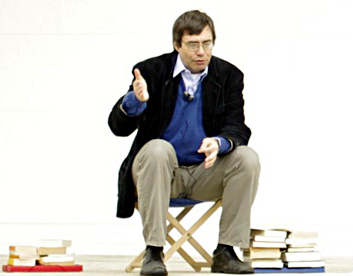| |
Gianluigi Segalerba

GHA Ambassador of Peace and Disarmament from Harmony/Nonviolence in Europe, Institutional Affiliation: Arbeitskreis Kulturanalyse Universität Wien (Working group cultural analysis University of Vienna), Address: Vienna, Austria, Address in Italy: Via Dassori 29/5B, 16131 Genoa, Email: gianluigi.segalerba@univie.ac.at, gianluigisegalerba@gmail.com, Skype: gianluigi.segalerba Personal page: https://peacefromharmony.org/?cat=en_c&key=919 I was born in Genoa in 1967. I graduated in Philosophy at the University of Pisa in 1991 and obtained my PhD in Philosophy at the University of Pisa in 1998. I was visiting scholar at the Universities of Tübingen, of Berne, of Vienna. My first publication was “Note su Ousia” (Pisa 2001). I was then co-editor of the volume “Substantia – Sic et Non” (Frankfurt on the Main 2008), and I am the author of the book “Semantik und ontologie: Drei Studien zu Aristoteles” (Berne 2013). I currently live and work in Vienna. Biographical references: Date and place of birth: 24 June 1967, Genoa, Italy.
Citizenship: Italy Education: June 1991: attainment of the MA in Philosophy at the Institute of Philosophy of the University of Pisa. June 1998: attainment of the Ph.D. in Philosophy at the Institute of Philosophy of the University of Pisa. Parents: Father: Giovanni Segalerba, Jurisprudence, Notary, deceased on 16 May 1983 Mother: Jurisprudence (University of Genoa), Employee Marital Status: married Children: three, 1 male, two twins females Hobbies:- Hobbies: Trekking, Cinema, Literature, Arts, Art Exhibitions, swimming.

Publications Books and articles: Segalerba, G., Note su Ousia, ETS, Pisa 2001, 307 pages. Segalerba, G., Numerische Einheit als ontologisches Kriterium. Zur Unterscheidung der Entitäten bei Aristoteles, in: «Wiener Jahrbuch für Philosophie», volume XXXV, 2003, pp. 59-96. Segalerba, G., Eins neben den vielen Dingen und Eins bei den vielen Dingen: Anzeichen einer alternativen ontologie bei Aristoteles, in: «Internationale Zeitschrift für Philosophie», 2/2005, pp. 44-73. Segalerba, G., Aristoteles’ Entdeckung des wahrhaft Allgemeinen, in: «Wiener Jahrbuch für Philosophie», Volume XXXVIII, 2006, pp. 203-246. Segalerba, G., Aspekte der Substanz bei Aristoteles, in: «Substantia – Sic et Non», edited by H. Gutschmidt, A. Lang-Balestra, and G. Segalerba, ontos Verlag, Frankfurt am Main 2008, pp. 35-84. Segalerba, G., Nachwort zur Substanz (together with A. Balestra und H. Gutschmidt) in: «Substantia – Sic et Non», edited by H. Gutschmidt, A. Lang-Balestra und G. Segalerba, ontos Verlag, Frankfurt am Main 2008, pp. 542-560. Segalerba, G., Die aristotelische Substanz als Wendepunkt in der ontologie der Antike, in: «Archiv für Begriffsgeschichte», Sonderheft 8, 2010, pp. 161-172. Segalerba, G., Ohne Satz vom Widerspruch keine Entität. Der Satz vom Widerspruch als Strukturformel der Realität, in: «The Journal of Ancient Philosophy», Volume 5, 2, 2011, pp. 1-57. Segalerba, G., Die Offenheit des Individuums für das Neue als Basis für jegliche Form von Lernprozess, in: «University Meets Public – Nachlese. Ausgewählte Beiträge zum Thema „lernende Gesellschaft“», edited by E. Brugger, E. Gornik, B. Neichl, N. Tomaschek, Edition Volkshochschule, Vienna 2011, pp. 50-58. Segalerba, G., Semantik und ontologie. Drei Studien zu Aristoteles, Peter Lang Verlag, Berne 2013, XVII+547 pages. Segalerba, G., Das Monster in uns, in: «Philosophical Inquiry», Volume 40, Issue 1/3, Winter/Spring 2016, pp. 38-57. Segalerba, G., Das Manifest für eine Neue ontologie: Metaphysik My 10, in: «Revue Romaine de Philosophie», Vol. 52, Issue 2, July-December 2015, pp. 209-237. Segalerba, G., Dividuum, in: „Sehen und Sagen. Für Walter Seitter“, edited by Ivo Gurschler, Sophia Panteliadou, Chistopher Schlembach, Vienna 2017, pp. 54-57. Segalerba, G., Lasst uns den Weg einer neuen ontologie einschlagen! (1. Teil), in: „Analele Universitǎţii din Craiova, Seria: Filosofie, Nr. 40 (2/2017), Seiten 91-183 https://cis01.central.ucv.ro/analele_universitatii/filosofie/2017/Anale40_2.pdf. Segalerba, G., Anmerkungen über Tierethik, in: „Analele Universitǎţii din Craiova, Seria: Filosofie, Nr. 41 (1/2018), Seiten114-122 https://cis01.central.ucv.ro/analele_universitatii/filosofie/2018/Anale41_1.pdf. Segalerba, G., Lasst uns den Weg einer neuen ontologie einschlagen! (2. Teil), in: „Analele Universitǎţii din Craiova, Seria: Filosofie, Nr. 42 (2/2018), Seiten 5-48 https://cis01.central.ucv.ro/analele_universitatii/filosofie/2018/Anale42_2.pdf. Segalerba, G., The Drama of the Human Condition. Notes on the causes and origins of Evil in Plato’s Republic, in: „Revue Roumaine de Philosophie, Vol 63, Issue 1, January-June 2019, Seiten 19-35. Presentation of the Italian book Segalerba, G., Selbstanzeige „Note su Ousia“ in: «Archiv für Begriffsgeschichte», Volume 45, 2003, pp. 265-267. Editorships Substantia - Sic et Non, together with Antonella Balestra and Holger Gutschmidt, ontos Verlag, Frankfurt am Main 2008. Revue Roumaine de Philosophie, Vol 52, Issue 2, July-December 2015 (Guest Editor). Revue Roumaine de Philosophie, Vol 63, Issue 1, January-June 2019 (Guest Editor with Professor Cornel-Florin Moraru, National University of Arts, Bucharest, Romania).
My article in this newest book 2020
Mahmoud Masaeli, Nikolaos Asproulis, Rico Sneller
& Timo Slootweg (eds.)
Faith in Democracy.
Justice, Politics and Transcendence
This book explores the spiritual potential of faith, mysticism and
transcendence in answer to the dangers of a mythologised state and
the sacro-sanctification of (liberal) democracy and its rule of law. It
searches for a curative for the pathological transformation of these
institutions into – so called – political religions. Along this line, it
explores the importance of spirituality and transcendence for political
legitimacy, democratic participation and international cooperation, law
and politics.
There being no general agreed-upon definition of ‘spirituality’, the
authors examine what may be seen as ‘spiritual' dimensions of the
political. These dimensions have in common a focus on transcendence
as a vanishing point of rationality and rational justification. This
vanishing point may become manifest, for example, in a primordial
requisite of becoming an individual person; in responding – in freedom
– to the call of theocracy; in the phenomenon of prophecy or political
wisdom; in the remaining shards of formerly all-pervasive religious
institutions; in tenacious hope for a democracy-to-come; in the
courageous resilience and resistance of citizens of ‘non-’ or ‘undemocratic'
states; etc.
The authors of this book, philosophers, theologians, psychologists,
jurists and others, are more or less suspicious of the Modern theories
of the social contract allegedly justifying democracy. It may turn out,
however, that the inexhaustive and unfathomable dimension of ‘faith’
which comes up as an alternative is not so easy to handle as a ‘rational
argument’. This ‘impracticality' of faith and transcendence might be the
irreducible yet indispensable predicament of democracy.
Gompel&Svacina Uitgevers
Reebokweg 1, B-2360 Oud-Turnhout | Rietveldenweg 60, NL-5222 AS 's-Hertogenbosch
------------------------------------------------------------------------------------------

Step 2
The GHA book “Mahatma Gandhi…Gandhica” Review https://peacefromharmony.org/?cat=en_c&key=848 ---------------------------------------------------------------------------------------------
Step 3
Statistical Research during 4 hours: Spherons of Italy (or Austria? What is better?) in 2017 or in 2018, what is better? Up to February 1. Is it possible? (Method see in Gandhica, Chapter 1, 2, pp 32-36 and 41-88) ---------------------------------------------------------------------------------------------
Step 4
Historical and Philosophical Research during 3 months (deadline April 1, 2020): Gandhi's interpretation of Rigveda's Varnas in his "My Religion" in Chapter 36: "Varna and Caste" (To publish your research in the GHA new book "Gandhicracy", See Gandhica, pp 94-97, 157-167) ---------------------------------------------------------------------------------- Gianluigi Segalerba
Create Sattva in ourselvesRemarks on Gandhi’s interpretation of Gita
In process
Up
|